After the minor blockbuster deal that relieved Blake Griffin of his athletic duties in Detroit and eventually landed him in Brooklyn, the world started to ask if his acquisition moved the needle even more for the Nets’ championship hopes. Naturally, this sets forth the question of Brooklyn’s Finals likelihood before the signing, and whether or not Griffin actually changes those odds.
The Raw Numbers
The aggregate Brooklyn Nets team so far, meaning the inclusions of stints with and without the later additions like James Harden, is not on track to win the championship. With an SRS of +4.65 through their first 37 games, the Nets would be on track for 54 wins during a regular 82-game season (corresponds to a rough 65.5% win percentage). Compared to their actual win percentage of 64.9% (24 – 13), a small argument could be made that Brooklyn’s record is currently understating them, although the difference isn’t even enough to add an extra win to their “Pythagorean” record.

Historically speaking, NBA teams don’t enter legitimate title candidacy with an SRS below +5. According to Ben Taylor’s CORP overview on Nylon Calculus: “Since Jordan returned in 1996, no healthy team has hung a banner with an SRS differential below 5.6 and only one (the ’03 Spurs) was below 6.6.” (This was written before the Raptors hung their own banner in 2019). This means, assuming Brooklyn doesn’t obtain some major catalyst for the second season, either in terms of roster development or team chemistry, they aren’t viable pick as the “title favorites.” However, these figures aren’t totally representative of how good the Nets are right now, as they included games before the addition of James Harden and all of them exclude the efforts that Griffin will bring to the table.
Brooklyn with Harden?
Because Griffin, a very good player in his own right, will make a lesser impact on the Nets than James Harden, the latter player is the more important focus when gauging the team’s championship likelihood. Harden’s larger role and greater influence on the scoreboard will resultantly have a more significant impact on whether or not Brooklyn eclipses the cluster of “good-not-great” teams and into championship contention.
During the past, we’ve seen that bringing in more star talent is not additive. When the Golden State Warriors won 73 games in 2016 they were evidently a super-team, posting a +10.38 SRS and nearly claimed the title as the greatest team ever before falling to LeBron James’s Cavaliers in seven games (although I don’t think the Finals loss necessarily topples Golden State’s case, either). When they replaced (mostly) Harrison Barnes’s minutes with a peak Kevin Durant, they clocked in as a +11.35 SRS team in 2017. (We’re controlling for low-minute, replacement-level additions and subtractions as near negligible). Based on the historical distribution of Adjusted Plus/Minus data, a +1 player wouldn’t even be an All-Star level contributor. Does this mean Kevin Durant wasn’t even as good as a “sub” All-Star in 2017? Of course not. But his value to the Warriors was likely closer to that number than the same figure if he were on an average team.
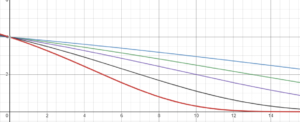
My “portability” curve estimates in which players are grouped into five tiers – the graph shows the change in per-game impact for a +4 player across all tiers and team SRS (x-axis) differentials greater than zero.
This is why there were so many concerns surrounding James Harden’s arrival in Brooklyn. Would the immersion of so many offensive superstars, especially ones that lack some of the “portable” traits we saw succeed in Golden State, it was perfectly reasonable to suggest that diminishing returns would eventually kick in with the Nets and their offense would nearly plateau. But has this been the case? Through Harden’s first 23 games in Brooklyn, the offense has been scoring 123.3 points every 100 possessions with him on the floor, which would comfortably finish as the greatest team offense of all-time, as well as being a mark comparable to Curry and Durant’s team offenses in Golden State. But similar to those Curry-Durant lead teams, having a historically-great offense with stars on the floor doesn’t guarantee a championship (plus, Golden State fared very well in a department in which Brooklyn severely lacks: defense).
With Harden off the floor, Brooklyn’s offense scores 116.3 points every 100 possessions: still a very good team offense, but not nearly as good when the Beard is checked in. Does this mean Harden contributes +7 points every 100 possessions to the Brooklyn Nets? Not necessarily. On-off ratings are highly influenced by how a team staggers its playing time, i.e. a player may spend all his minutes with the team’s stars or the team’s scrubs. However, if we comb through the Nets’ n-man lineups, we can gain insight as to how the additions and replacements of one of Durant, Harden, and Kyrie Irving would increase the team’s offensive heights.
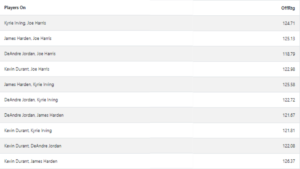
(? PBP Stats)
It’s no surprise that the Nets’ offense is at the peak of its powers when Durant and Harden, the team’s two best offensive players, are on the court together, posting a whopping 126.4 offensive rating. Now let’s look at how Durant and Irving-led offenses fare: a similarly outstanding 121.8 points per 100. A five-point SRS difference could be the difference between near-locks and playoff contention; however, we’re already seeing a declination in Harden’s supposed influence on Brooklyn’s offense. But wait, there’s more! Let’s look at the Nets’ four-man units to further gauge Harden’s offensive value in Brooklyn.
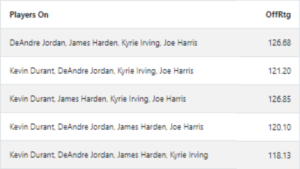
(? PBP Stats)
There are some really interesting implications here. Using five of Brooklyn’s regulars, take a look at the Brooklyn offense without Kyrie Irving: still a great 120.1 offensive rating. If we take DeAndre Jordan, the worst offensive player, out of the lineup and replace him with Kyrie Irving, the offense only improves by +1.1 points every 100 possession. Even giving Irving the easier route using Jordan as the control rather than, say, Joe Harris, the diminishing returns effect is perfectly clear. Replicating the same exercise for Harden – looking at how good his offenses are compared to Jordan’s – we get an estimate of +5.7 points of offensive impact every 100 possessions. This is similar to what has been suggested so far and is thus no surprise. However, what is surprising is where Kevin Durant stands in this approach.
With Brooklyn’s four best (healthy?) offensive players on the floor (the Big-3 and Joe Harris), they score an astronomical 126.9 offensive rating. Once again, with DeAndre Jordan in Durant’s place, we see that mark take a minor toll to a 126.7 offensive rating. Does this mean Durant is only worth +0.2 points every 100 possessions to the Nets’ offense? Of course not. It doesn’t only defy the rational suppositions we have on Durant’s value, but there is some level of confoundment here. The extenuating circumstances do permit leniency, but lots of observed basketball trends still hold here. However, this does relate to later ideas we’ll explore. Lastly, the most damning piece of evidence in favor of the “portability” conundrum is how Joe Harris falls into the equation. A low-demand, high-efficiency shooter – an ideal mold for a complementary offensive piece – would have some of these diminishing returns alleviated, right? It turns out that’s more than true.
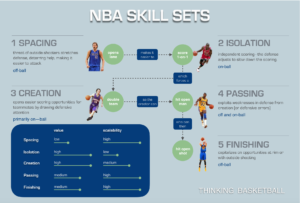
(? Backpicks – Do Joe Harris’s more “scalable” traits make him even more valuable to the Nets’ high-powered offenses than their stars?)
Without Joe Harris in the lineup among these five players, Brooklyn’s offense hits a low at a 118.1 offensive rating. Similar to the “replacement-level” route used for the previous three players, let’s look at the “Big-4” offense once more: the same astounding 126.9 offensive rating. That means, relative to the game setting and substitution, Joe Harris was worth +8.7 points more to Brooklyn’s high-level offenses relative to DeAndre Jordan. Perhaps let’s even the playing field out more. With Kyrie Irving as the replacement player, Harris’s offenses are +2 points more efficiency every 100 possessions. This is a very significant indicator of Harris’s “portability” in the Nets’ lineups. Does this mean he’s a more valuable offensive player than Irving? Not necessarily, but it suggests Harris’s main department (scalability) raises the ceiling for these high-level offenses more than Kyrie Irving’s skills, which start to blend in after so much offensive talent is thrown into the mix.
This is supported by single-year RAPM (Regularized Adjusted Plus/Minus). Most of the time, players like Durant (+2.17 ORAPM) and Irving (+2.37) are more valuable offensive players than Harris (+1.99), but the relatively small gap paired with our previous knowledge on the subject corroborates even more: once Brooklyn’s offense becomes astronomically good, using players’ scalable traits will raise the ceiling even more. This is antithetical to a player like Allen Iverson (AKA a “floor raiser”). But there’s still one unanswered question: why was James Harden seemingly a more valuable offensive player than Durant and Irving (but especially Durant). If Harden is the player being added to the preexisting roster, why doesn’t he experience many diminishing returns? The answer: load and role trade-offs.
James Harden is comfortably the most ball-dominant of Brooklyn’s offensive stars, holding the ball for an average of 5.42 seconds per touch on 93.3 touches per game according to Synergy tracking data. Although there is a reduction from last season, as implied through the “portability” construct, this change wasn’t unexpected. Meanwhile, his teammates Durant and Irving clock in at 3.11 seconds per touch / 69.5 touches per game 4.44 seconds per touch / 75.1 touches per game, respectively. When Harden takes the load off Durant and Irving, he’s absorbing a significant amount of their offensive impact. So while Harden’s offensive impact didn’t change a whole lot, Durant’s and Irving’s did.
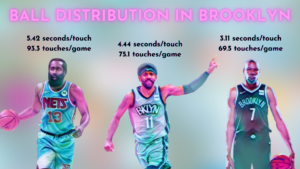
“Portability” usually observes the “internal” changes, or how individuals fares in different environments, but the other half of that coin of how traits like ball-dominance affect the portability of teammates. These phenomena explain why Harden’s offensive impact is comparable to his role in Houston and why Joe Harris is arguably more valuable to extremely high-octane offenses than Kyrie Irving.
So what about Griffin?
A part of the beauty of interpreting the Blake Griffin trade is that, no matter how good he is with the Nets, his impact will become redundant. Whether he lets his injuries define his post-thirty era or transforms back into 2019 Blake Griffin, there’s simply a limited amount of offensive impact to go around. If Griffin were reminiscent of his early-2010s self, perhaps he’ll show notable ability to fit well alongside star talent; but based on his time with the Pistons, Griffin isn’t a very high-portability player. Thus, if I were Steve Nash and the Nets’ coaching staff, I wouldn’t slot Griffin into the starting lineup or into the lineup early on in the first quarter (because, contrary to popular belief, games are often won by building suitable leads in the first quarter). Instead, Griffin would better serve his purpose as an anchor of the second unit, depending on how good he is again because we still don’t have a very clear picture of that.
Conclusively, regardless of the “goodness” Griffin brings to the table, he’ll be spending too much time alongside too many offensive superstars with too little defensive equity, and his value to the Nets won’t be especially significant given his minutes aren’t drastically staggered against the starters’ playing time. With all this information processed, there’s now a clearer picture as to where they stand in the current playoff picture. Given the trade-offs between Durant’s, Harden’s, and Irving’s offensive impact, we can’t expect Brooklyn’s offense to be that much better. (The loss of defensive shares in the Harden trade is why I still think Brooklyn would’ve been better off refraining.) Due to the unstable state of the team defense (looking to approach well-below-average), the team’s regular-season SRS will likely max out at +5, and I could see a top-three seed as perfectly reasonable – Brooklyn is still a very good team!
And the Playoffs?
During the postseason, Kevin Durant will have the same luxury he did with the Warriors: acting as the secondary offensive star. The stress taken of his load between OKC and Golden State explains a lot of the stat inflation during the 2017 and 2018 title runs, and thus, his scoring could thrive to a similar level. But then there’s Harden. As his load hasn’t changed too much, and his skills become more redundant in the second season, he’ll likely pose a similar threat compared to previous seasons (although the eased burden with more stars alongside him could open up more catch-and-shoot opportunities). Irving is just one more offensive threat to add to this equation and will continue to woo defenses away from overplaying one of the stars.
The prospect of Brooklyn’s offense in the Playoffs is intriguing; however, the results we’ve seen so far make those ideas more of an “on paper” scenario. The applicability of this style has yet to materialize into firm action. The inevitable threat of facing above-average offenses will continue to deconstruct the Nets’ defense, and I don’t see a ton of evidence to suggest Brooklyn will notably improve from its +5 SRS caliber player during the regular season. Depending on how the Bucks and Sixers pan out in the second season, I could reasonably see the Nets in the NBA Finals, although this is more due to a subpar Eastern Conference than actual Finals-caliber play on their part. However, I’d really have to squint to see Brooklyn topple either of the healthy Los Angeles teams, and even teams like Phoenix would pose a legitimate threat.

(? ClutchPoints)
When all is said and done, I don’t expect to see the Nets lift the Larry O’Brien trophy. Based on the current landscape of the East, a Finals berth is not out of reason. Milwaukee and Philadelphia are legitimate threats, and although I favor the Nets over the 76ers, I think Milwaukee is entirely capable of pushing through. Based on my expectations for the Brooklyn Nets (+5 SRS), the odds they win the title would clock in at roughly 2.6%. But because the East is so depleted and I’m not 100% confident in that evaluation, my reasonable range for the Nets’ championship odds is between 3% and 7%. The lesson to preach: bet on the field.
